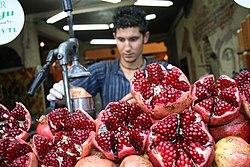Pomegranate juice

Pomegranate juice is juice made from the pomegranate fruit. It is used in cooking both as a fresh juice and as a concentrated syrup, particularly in Persian cuisine. The health benefits of pomegranate juice have been successfully promoted by Pom Wonderful a pomegranate products manufacturer, but as of September, 2010 the company and its principals were the subject of a deceptive advertising complaint by the Federal Trade Commission.[1]
Possible health benefits and risks
While preliminary research has shown that the fruit juice may play a role in reducing the risk of cancer, reducing serum cholesterol, and protecting arteries from clogging, more research is needed to validate these findings. Its possible benefits also need to be balanced against its high caloric content derived from its natural sugars.
The cholesterol reduction effect has been observed only in small studies.[2] This, as well as the anti-clogging effect of pomegranate juice, are the result of its concentration of antioxidants, and are similar to the effects shown in studies of red wine, black tea, and purple grape juice. There have been no large clinical trials showing that antioxidants can prevent heart attacks or other major heart-related events.[3]
A peer-reviewed study showed that men who had undergone surgery or radiation therapy for prostate cancer could significantly slow the increase of prostate specific antigen when they consumed a glass of pomegranate juice daily.[4]
A 250 ml (8 oz) glass of pomegranate juice provides approximately 50% of an adult's recommended daily allowance (RDA) of the vitamins A, C and E, 100% RDA of folic acid, and 13% RDA of potassium.
Notwithstanding the possible benefits of the juice, each such glass also tops the maximum daily amount of sugar, as recommended by the Food and Agriculture Organization and the World Health Organization. The organizations jointly recommend that only 10% of calories come directly from sugars.[5] With almost 30 grams of sugar, a glass of pomegranate juice has more sugar than an equal size serving of some soft beverages, such as Coca Cola Classic[6] and roughly equal to two servings of a sweetened breakfast cereal.
Pomegranate molasses
Pomegranate molasses is made by boiling down the juice of a tart variety. It forms a thick, dark brown liquid that is used in Turkish rice pilaf and shepherd's salad.[7]
References
- ^ "Claims by Pom Juice Called Deceptive" Associated Press article The New York Times September 27, 2010, accessed September 27, 2010
- ^ http://www.mayoclinic.com/health/pomegranate-juice/AN01227
- ^ http://www.webmd.com/food-recipes/news/20050321/pomegranate-juice-may-clear-clogged-arteries
- ^ Pantuck, A. et al., "Phase II study of pomegranate juice for men with rising prostate-specific antigen following surgery or radiation for prostate cancer.", Clinical Cancer Research, Vol. 12, 4018-4026, July 1, 2006.
- ^ http://en.wikipedia.org/wiki/Carbohydrate#Nutrition
- ^ http://www.thecoca-colacompany.com/mail/goodanswer/soft_drink_nutrition.pdf
- ^ Willoughby, John (March 23, 2010). "Making a Foreign Staple Work Back Hom". New York Times. Retrieved 2010-03-25.
Turned out it was pomegranate molasses. Made by boiling down the juice of a tart variety of pomegranate, this thick, dark brown, deeply flavorful liquid is also used in Turkish pilafs and, in southern Turkey, in the ubiquitous shepherd's salad. In other Middle Eastern cuisines, it is most often found in soups and stews.
{{cite news}}: Cite has empty unknown parameter:|coauthors=(help)
Further reading
- Malik, Arshi et al. "Pomegranate fruit juice for chemoprevention and chemotherapy of prostate cancer", Proceedings of the National Academy of Sciences, 102:14813-14818, 2005.
- de Nigris, Filomena et al. "Beneficial effects of pomegranate juice on oxidation-sensitive genes and endothelial nitric oxide synthase activity at sites of perturbed shear stress", Proceedings of the National Academy of Sciences of the United States, 102: 4896-4901, 2005.
- Aviram, M. et al. "Pomegranate Juice Consumption for 3 Years by Patients with Carotid Artery Stenosis Reduces Common Carotid Intima-Media Thickness, Blood Pressure and LDL Oxidation", Clinical Nutrition, (2004), 23: 423-433.
- Aviram, M. and L. Dornfeld. "Pomegranate Juice Consumption Inhibits Serum Angiotensin Converting Enzyme Activity and Reduces Systolic Blood Pressure", Atherosclerosis (2001), 158: 195-198.
- Aviram, M. et al. "Pomegranate Juice Flavonoids Inhibit Low-Density Lipoprotein Oxidation and Cardiovascular Diseases: Studies in Atherosclerotic Mice and in Humans", Drugs Under Experimental and Clinical Research (2002), 28(2/3):49-62.
- Kaplan, M et al. "Pomegranate Juice Supplementation to Atherosclerotic Mice Reduces Macrophage Lipid Peroxidation, Cellular Cholesterol Accumulation and Development of Atherosclerosis", Journal of Nutrition (2001), 131(8): 2082-2089.
- Noda, Y. et al. "Antioxidant activities of pomegranate fruit extract and its anthocyanidins: delphinidin, cyanidin, and pelargonidin," Journal of Agricultural Food and Chemistry (2002);50(1):166-71.
External links
- Lovgren, Stefan. "Pomegranate Juice Fights Heart Disease, Study Says", National Geographic News, March 22, 2005. Accessed February 13, 2006
- Organic Pomegranate Juice
- 11 Health Benefits of Pomegranate Juice—a list, without references, of benefits that pomegranate juice "may" provide

